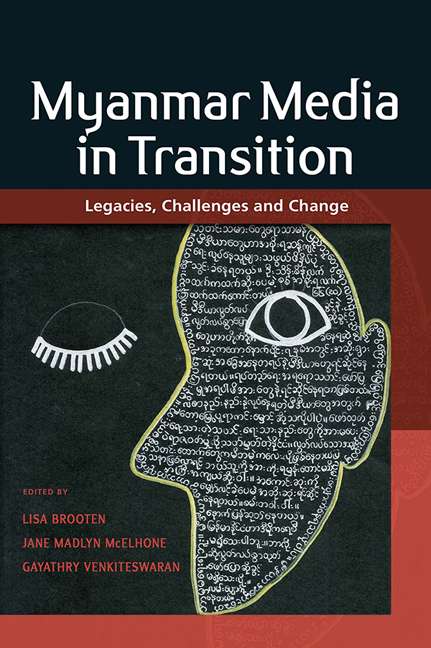Book contents
- Frontmatter
- Contents
- Contributors and Editors
- Burma or Myanmar? A Note on Terminology
- 1 Introduction: Myanmar Media Historically and the Challenges of Transition
- Part I Structural Constraints and Opportunities
- Part II Journalism in Transition
- Part III Creative Expression
- Part IV Society and Media
- 18 The Tea Shop Meets the 8 O'clock News: Facebook, Convergence and Online Public Spaces
- 19 From Blogging to Digital Rights: Telecommunications Reform in Myanmar
- 20 Counter-Narratives: Myanmar's Digital Media Activists
- Epilogue: Media Studies in Myanmar – Where Do We Go from Here?
- Index
18 - The Tea Shop Meets the 8 O'clock News: Facebook, Convergence and Online Public Spaces
from Part IV - Society and Media
Published online by Cambridge University Press: 07 September 2019
- Frontmatter
- Contents
- Contributors and Editors
- Burma or Myanmar? A Note on Terminology
- 1 Introduction: Myanmar Media Historically and the Challenges of Transition
- Part I Structural Constraints and Opportunities
- Part II Journalism in Transition
- Part III Creative Expression
- Part IV Society and Media
- 18 The Tea Shop Meets the 8 O'clock News: Facebook, Convergence and Online Public Spaces
- 19 From Blogging to Digital Rights: Telecommunications Reform in Myanmar
- 20 Counter-Narratives: Myanmar's Digital Media Activists
- Epilogue: Media Studies in Myanmar – Where Do We Go from Here?
- Index
Summary
“If the people get the right information about the army they will understand us.… They'll see the military is defending the interests of the people and implementing the interests of the people and defending against threats to the country.”
—Senior General Min Aung Hlaing“We can say that we are free. But the problem is that we are not safe.”
—Blogger and activist turned politician Nay Phone Latt“I attracted people to express their opinions and attitudes on my Facebook wall. Sometimes I feel upset and disappointed about the profane language used in writing on my wall. But, since the benefits outweigh the disadvantages, I shall continue to maintain this page.”
—Former Information Minister Ye HtutThe opening of online spaces and the rapid dissemination of mobile phones since the beginning of the political transition have made possible a forum for discussion unlike any before in Myanmar's history. Yet shocking examples of online hate speech have dominated international media headlines. Facebook, especially, has been identified as a significant forum for inciting the brutalities perpetrated against the Rohingya Muslims in Rakhine state. In March 2018, the chairman of the UN Independent International Fact-Finding Mission on Myanmar, Marzuki Darusman, told reporters that Facebook had played a “determining role” in the conflict. In April, Facebook's CEO Mark Zuckerberg testified in front of the U.S. Congress about his company's response to these accusations. And in August, a UN-mandated factfinding mission released its report calling for Myanmar's top military leaders to be investigated and prosecuted on charges of genocide, crimes against humanity and war crimes, and highlighting Facebook's role as a tool for those intending to spread hate. The release of this report sparked Facebook's decision the following day to remove eighteen Facebook accounts, one Instagram account and fifty-two Facebook pages affiliated with the military, including the official pages of Senior General Min Aung Hlaing, commander-in-chief of the armed forces, and the military's Myawaddy television network (Facebook 2018b).
Facebook's role in hate speech and the resultant waves of violence have dominated discussions and are detailed in the introductory chapter and the chapter by Sarah Oh in this volume. Yet the ways in which social media are bringing more hopeful new or hybrid forms of communication and expression are also important to highlight.
- Type
- Chapter
- Information
- Myanmar Media in TransitionLegacies, Challenges and Change, pp. 327 - 365Publisher: ISEAS–Yusof Ishak InstitutePrint publication year: 2019

